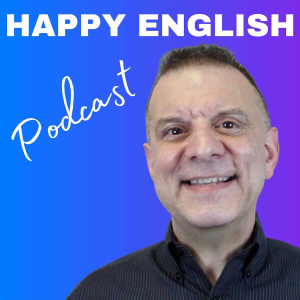
Happy English Podcast
Language Learning Podcasts
This is an American English Podcast with your host Michael DiGiacomo from Happy English in New York City. You will learn real American English speaking and pronunciation with Michael, who has been teaching English since 1994. This is an English as a Second Language (ESL) and English as a Foreign Language (EFL) podcast that brings you fun, practical, and useful English lessons which are ideal for intermediate and advanced level English learners everywhere. This podcast is perfect for university students, business professionals, homemakers, retirees and anyone who is interested in learning and improving their English skills. Every week, you are going to learn American English idioms, conversational expressions and phrasal verbs. As your American English teacher, I will help you learn real and natural American English pronunciation and conversational style. You will get the chance to improve your vocabulary and have a clear understanding of practical English grammar. I also help you have a deeper understanding of American Culture through language learning. Join my podcast learner's study group to practice these lessons with me each week on zoom. Get Happy, Get English. Happy English!
Location:
United States
Genres:
Language Learning Podcasts
Description:
This is an American English Podcast with your host Michael DiGiacomo from Happy English in New York City. You will learn real American English speaking and pronunciation with Michael, who has been teaching English since 1994. This is an English as a Second Language (ESL) and English as a Foreign Language (EFL) podcast that brings you fun, practical, and useful English lessons which are ideal for intermediate and advanced level English learners everywhere. This podcast is perfect for university students, business professionals, homemakers, retirees and anyone who is interested in learning and improving their English skills. Every week, you are going to learn American English idioms, conversational expressions and phrasal verbs. As your American English teacher, I will help you learn real and natural American English pronunciation and conversational style. You will get the chance to improve your vocabulary and have a clear understanding of practical English grammar. I also help you have a deeper understanding of American Culture through language learning. Join my podcast learner's study group to practice these lessons with me each week on zoom. Get Happy, Get English. Happy English!
Twitter:
@happyenglishny
Language:
English
Contact:
5165824181
Website:
https://www.myhappyenglish.com/
Email:
happyenglishny@gmail.com
987 - How to Change the Topic Politely in English
Duration:00:08:07
986 - Liaison Shadowing- Whaddaya Think
Duration:00:02:20
985 - At the End of the Day - English Tips in a Minute | Happy English
Duration:00:01:59
984 - Follow Through On - Phrasal Verbs in a Minute | Happy English
Duration:00:01:24
983 - Talking About Rest in Everyday English
Duration:00:08:14
982 - Naturally Talking About Stress and Being Busy
Duration:00:08:44
981 - Stretching Words - Speak Naturally in a Minute | Happy English
Duration:00:01:34
980 - Long Story Short - English Tips in a Minute | Happy English
Duration:00:01:51
979 - Stick To - Phrasal Verbs in a Minute | Happy English
Duration:00:01:19
978 - Casually Talking About the Past in English
Duration:00:09:19
977 - Conversational Response Phrases In English
Duration:00:05:26
976 - Wonder vs. Wander - Speak Naturally in a Minute | Happy English
Duration:00:02:20
975 - That Reminds Me – English Tips in a Minute | Happy English
Duration:00:01:40
974 - Find vs. Find Out - Phrasal Verbs in a Minute | Happy English
Duration:00:01:27
973 - Giving Advice in English - Have You Ever Thought About It?
Duration:00:08:44
972 - Why Americans Don’t Say the T in Winter
Duration:00:01:39
971 - Talking About Plans and Intentions in English - Want To, Plan To, Be Going To, Hope To, and Intend To
Duration:00:08:09
970 - It Turns Out - English Tips in a Minute | Happy English
Duration:00:01:42
969 - Map Out - Phrasal Verbs in a Minute | Happy English
Duration:00:01:34
968 - Talking About Obligation in English - Have To, Must, Need To, and Be Supposed To
Duration:00:09:07